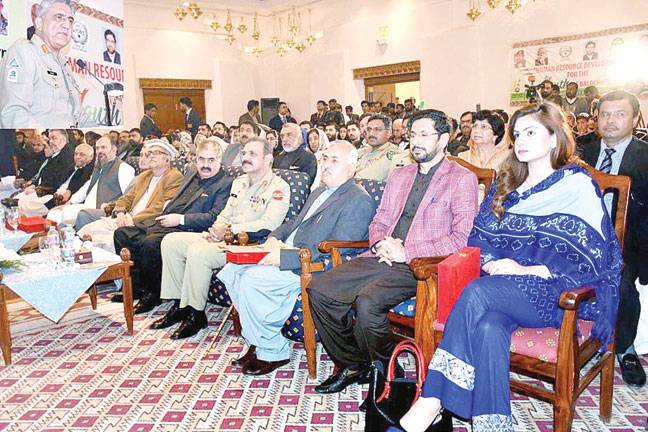Quetta - Chief of Army Staff General Qamar Javed Bajwa on Thursday criticised religious seminaries for mostly teaching only Islamic theology, leaving students ill-equipped for life in the modern world.
“I am not against madrassas, but we have lost the essence of madrassas,” he told a youth conference in Quetta, stressing the country needs to ‘revisit’ the religious schools concept.
The army chief also said that “tomorrow’s Balochistan will be engine of national development” and prove an invaluable link from north to south and also to west.
In a double entendre, he said he believes in democracy and even more so in the democratic values of selfless service and supremacy of moral authority. “All of us have a duty to the nation.”
The country has seen repeated military coups and apprehensions have been expressed by different quarters about General Bajwa’s intentions, especially after the disqualification of ex-prime minister Nawaz Sharif – who believes that army is behind his ouster.
Modernising madrassas, which have mushroomed nationwide, is a thorny issue in Pakistan where religious schools are often blamed for radicalisation of youngsters but are the only education available to millions of poor children.
General Bajwa’s remarks, apparently off-the-cuff during a prepared speech, were a rare example of an army chief criticising the religious seminaries, which are often built adjacent to mosques and underpin Islamisation efforts by religious hardliners.
General Bajwa said he was recently told that 2.5 million students were being taught in madrassas belonging to the Deobandi school of thought alone.
“So what will they become: will they become Maulvis (prayer leaders) or they will become terrorists?” Bajwa asked, saying it was impossible to build enough mosques to employ the huge number of madrassa pass-outs.
“We need to look (at) and revisit the concept of madrassas... We need to give them a worldly education.”
Pakistan has over 20,000 registered madrassas, though there are believed to be thousands more unregistered ones. Some are single-room schools with a handful of students studying only the Holy Quran.
Security services have kept a close eye on madrassas associated with radicalising youths and feeding recruits to Islamist militant outfits that have killed tens of thousands of people in the South Asian country since 2000.
But only a handful of the schools have been shut down, the authorities’ hand stayed by fears of a religious backlash.
Bajwa said poor education was holding back the nation of 207 million people, and especially in madrassas.
“Most of them are just teaching theology. So what are their chances? What is their future in this country?”
The military last year proposed a plan to de-radicalise religious hard-liners by “mainstreaming” some into political parties, a plan initially rejected by the civilian government but which now appears to be taking form.
But this policy has suffered a setback as recently capital Islamabad was paralysed for nearly three weeks by a blockade staged by a newly formed ultra-religious party belonging to the otherwise peaceful Sunni-Brelvi school of thought.
Pointing to the brighter side of the situation, he said “our future is bright and our youth is fully capable of taking on the mantle”. Admiring Balochi youth, he said they were “as capable as youth of any area of Pakistan”.
“We have enough resources we just need to improve our human resource. The civil service needs to be made attractive so that the top talent comes to civil service. It is the backbone of any country,” underlined Bajwa.
Highlighting armed forces and law enforcement agencies’ share in educating Baloch students, he mentioned that presently over 25,000 of them were receiving quality education at various Army and FC-run schools and cadet colleges all over Pakistan.
As many as 20,000 daughters of Balochistan were serving in Army including over 600 as officers while 232 cadets are undergoing training at Pakistan Military Academy in Kakul.
Army chief added that so much was only the representation in Pak Army and the number gets even higher when they took into account Baloch youth in Pakistan Air Force, Pakistan Navy and other Law Enforcement Agencies.
The COAS announced establishment of an MRI centre at Turbat and expediting work on already announced educational institutions.
“Army is a state institution meant to serve the nation. Army shall continue to perform its role while national security and development remains a national obligation for all state institutions, averred the Army chief at the seminar.
Renowned speakers from academia, civil society, media and politicians also addressed the seminar titled “Human Resource Development for the youth of Balochistan – opportunities and challenges”.
Chief Minister Nawab Sanaull Zehri in his address said that the dependency of Balochistan on Centre would have to be ended by developing own resources as the province was replete with boundless natural resources.
He clarified that Balochistan wouldn’t develop unless its untapped resources were exploited for its progress.
“Balochistan wastes 1.5 million acre floodwater due to lack of dams,” said Zehri, adding if they were having resources, they can build dams to save this water to make the province self-reliant in agriculture.
The chief minister added that Balochistan’s population was meagre luckily, and proper exploitation of resources may enable the government to give 15,000 to 20,000 rupees per month to each unemployed family.
Gen Bajwa for revisiting madrassa teaching concept






